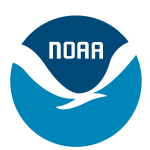- Industrie: Government
- Number of terms: 30456
- Number of blossaries: 0
- Company Profile:
NOAA Coral Reef Conservation Program, National Oceanic and Atmospheric Administration, U.S. Department of Commerce
One of the two cavities in the sides of the body of ctenophores (comb jellies) into which the tentacles can be withdrawn.
Industry:Natural environment
Skeleton, or support structure, which is on the inside of the organism's body. All vertebrates possess an endoskeleton that is made of either bone and/or cartilage.
Industry:Natural environment
The periodic rising and falling of the water that results from the gravitational attraction of the moon and sun acting on the rotating earth.
Industry:Natural environment
The temperature at which all motion will cease (0 degrees Kelvin or -273.15 degrees C).
Industry:Natural environment
The four anterior vertebrae and associated tissues in some fishes (catfishes, loaches, minnows, suckers) that connect the gas bladder to the inner ear, conveying pressure changes and sound.
Industry:Natural environment
A cell that discharges a sticky filament upon contact with a prey organism. Colloblasts are found in the tentacles of ctenophores (comb jellies). As the tentacles are dragged through the water, the colloblasts discharge and capture prey.
Industry:Natural environment
A filled or solid structure, as opposed to one that is tubular or hollow.
Industry:Natural environment
